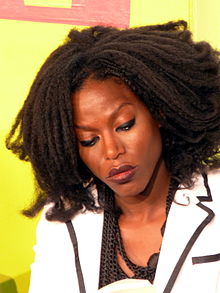Taiye Selasi
| Taiye Selasi | |
|---|---|

September 2013, Manfred Sause
|
|
| Born | Taiye Selasi 2 November 1979 London, United Kingdom |
| Occupation | Novelist |
| Ethnicity | Nigerian, Ghanaian |
| Alma mater | Yale University; Nuffield College, Oxford |
| Period | 2005–present |
| Literary movement | Realism, Drama |
Taiye Selasi (born 2 November 1979) is a writer and photographer. Of Nigerian and Ghanaian origin, she describes herself as a "local" of Accra, Berlin, New York and Rome.
Taiye Selasi was born in London, England, and raised in Brookline, Massachusetts, the elder of twin daughters in a family of physicians.
Her given name means first twin in her mother's native Yoruba.
Selasi's twin sister, Dr. Yetsa Kehinde Tuakli, is a physiatrist in the US. The first African member of the International Paralymic Committee, she competes in the long jump for Ghana's national team. Selasi's mother, Dr. Juliette Tuakli, is a paediatrician in Ghana. Renowned for her advocacy of children's rights, she sits on the board of United Way. Selasi's father, Dr. Lade Wosornu, is a surgeon in Saudi Arabia. Considered one of Ghana's foremost public intellectuals, he has published numerous volumes of poetry.
Selasi's parents broke up when she was an infant. She met her biological father at the age of 12.
Selasi graduated summa cum laude and Phi Beta Kappa with a BA in American Studies from Yale, and earned her MPhil in International Relations from Nuffield College, Oxford.
In 2005 The LIP Magazine published "Bye-Bye, Babar (Or: What is an Afropolitan?)", Selasi's seminal text on Afropolitans. In Bye Bye Babar, Selasi describes a new African diaspora; a broader mix that accepts its diversity: “Perhaps what most typifies the Afropolitan consciousness is the refusal to oversimplify; the effort to understand what is ailing in Africa alongside the desire to honor what is wonderful, unique.” Selasi does not seek recognition as the originator of Afropolitanism, “ She makes a point not to claim to have coined it, and she downplays her own role in the whole phenomenon that followed from it.” The conversation of Afropolitanism did increase, following the essay, and this paved way for scholars like Simon Gikandi and Achille Mbembe to “further develop” the term, Afropolitan, into a widely known a used ideology. The same year she wrote the essay, she penned a play which was produced at a small theatre by Dr. Avery Willis, Toni Morrison's niece.
...
Wikipedia
